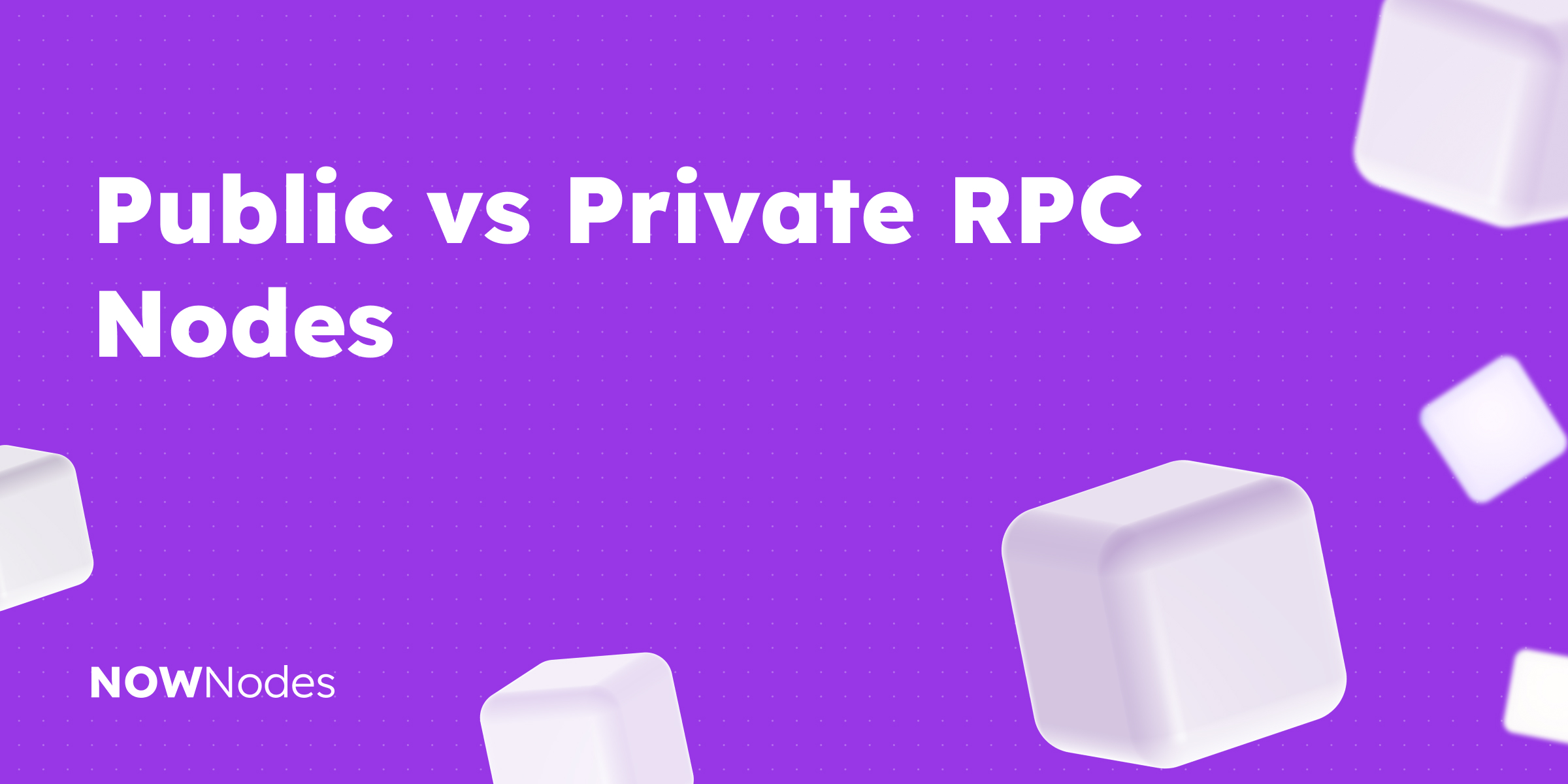Whether you’re building a DeFi app, NFT marketplace, GameFi platform, or a non-custodial crypto wallet, there’s one thing your project absolutely depends on: a reliable connection to the blockchain. That connection is made possible through something called an RPC node — the gateway that allows your application to communicate with a blockchain network. It’s how you read blockchain data, submit transactions, interact with smart contracts, or monitor events in real time. Here’s why it is important to understand your needs: Public vs Private RPC Nodes?
At first, most developers rely on public RPC endpoints. They’re free, simple to use, and work perfectly fine during the early stages of development. But as soon as traffic grows — or users expect things to “just work” — public nodes often become a bottleneck. Think rate limits, slow responses, random timeouts, or service outages at the worst possible time.
So, what’s the alternative? Private (or dedicated) RPC nodes. To decide which is best for your project, let’s first break down what each option means — and then compare them side by side.
What Is a Public RPC Node?
A public RPC node is a shared access point to a blockchain that anyone can use, usually hosted by the blockchain’s core development team or third-party contributors. You don’t need an API key or account. Just connect using the public endpoint, and you’re ready to start sending requests.
They’re great for:
- Learning how a blockchain works
- Experimenting with smart contracts
- Building a proof-of-concept or hackathon project
But there’s a catch.
Because public nodes are shared by thousands of developers, they’re not optimized for performance or reliability. During high network activity or token launches, these nodes get overwhelmed fast — and your app becomes vulnerable to timeouts, “429 Too Many Requests” errors, and incomplete data.
It’s like trying to stream a movie over a busy café’s Wi-Fi — fine for light use, but not great when it matters.
What Is a Private RPC Node?
A private RPC node is an isolated or dedicated connection to the blockchain, either fully hosted for you (by a provider like NOWNodes) or self-managed. With private access, your app gets:
- Stable bandwidth and faster responses
- Much higher rate limits
- Access to more advanced features (archive data, logs, tracing, etc.)
- Better security controls like API keys and IP whitelisting
- Professional-grade uptime and monitoring
This setup is designed for production environments, where performance and stability are critical. If you’re building a dApp that users rely on daily — or processing on-chain transactions in real time — this is what you need.
Public vs Private RPC Nodes: Quick Comparison
| Feature | Public RPC Nodes | Private RPC Nodes (like NOWNodes) |
|---|---|---|
| Access | Free, no signup | API key or subscription required |
| Speed | Slower, shared with others | Fast, isolated traffic |
| Rate Limits | Low (easy to hit) | High, adjustable |
| Stability | Unreliable under load | Guaranteed uptime (99.9%+ SLA) |
| Support | None | Dedicated engineering support |
| Advanced Features | Limited (no archive or tracing) | Full archive access, tracing, logs |
| Security | Publicly accessible | Private keys, IP whitelisting |
| Best For | Testing, personal projects | Production dApps, wallets, analytics tools |
When Public RPC Is Enough
There’s nothing wrong with starting out on a public RPC endpoint. In fact, it’s a smart move if you’re:
- Testing code in a staging environment
- Prototyping a feature
- Building locally without traffic
But public RPCs should be treated like sandbox tools — not something to bet your mainnet app on.
They’re best for light usage and low-risk experiments. Once real users start using your dApp, or once you start processing tokens, NFTs, or payments, public infrastructure simply won’t be enough.
Why Private RPC Changes the Game
With private RPC infrastructure, your app gets the network-level stability that real-world applications demand. You’re no longer sharing bandwidth with other projects, and you get access to premium capabilities that unlock better product performance.
Private RPC lets you:
- Scale confidently without fear of traffic spikes
- Support large numbers of concurrent users
- Access historical data from any block (useful for explorers, indexers, and analytics dashboards)
- Stream events in real time via WebSockets
- Prevent downtime with automatic load balancing and fallback nodes
You also get peace of mind. No more worrying if a sudden spike in user activity will crash your blockchain connection.
How NOWNodes Makes Private RPC Easy
At NOWNodes, we’re on a mission to make blockchain infrastructure simple, fast, and reliable — so builders can focus on building.
We provide instant access to over 110+ blockchains through both public and private RPC endpoints. Whether you’re building on Ethereum, Bitcoin, Polygon, Solana, Avalanche, Arbitrum, BNB Chain, or dozens of others — we’ve got your back.
With NOWNodes, you get:
- High-performance private RPC nodes with SLA-backed uptime
- Flexible pricing plans based on your needs
- Powerful dashboard for traffic insights
- Fast onboarding — just grab your API key and go
And most importantly — no node maintenance, no syncing, and no DevOps overhead. Try our free API key!
Final Thoughts
Choosing between public and private RPC access isn’t just a technical decision — it’s a product one.
If you’re still experimenting or in testnet mode, public RPC might do the job. But once you go live on mainnet, handle real value, or aim for scale, your infrastructure needs to grow with you.
A slow or unstable RPC endpoint can break user experience, delay transactions, or even expose your app to security issues. That’s why moving to a private RPC provider like NOWNodes is one of the smartest investments you can make early on.
Want to level up your dApp’s performance and reliability? Start building with private RPC infrastructure today — contact us!



